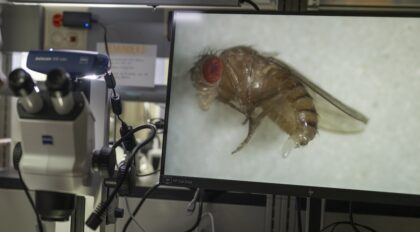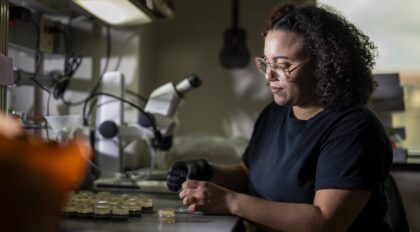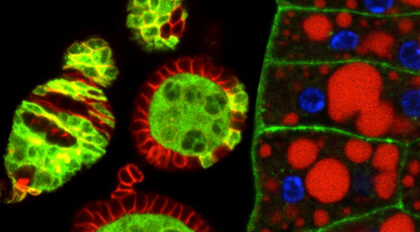Tag: Drummond-Barbosa Lab
‘Listen to what the flies tell us’
The Drummond-Barbosa Lab looks to the tiny fruit fly to understand big complex questions about the relationship between stem cell development and changes in diet, metabolism, and the environment.
Rising Sparks: Lexi Menendez, regenerative biology
Lexi Menendez credits Morgridge and the PREP program for jump-starting her research career and graduate school future.
Faculty and staff explore state’s rivers, culture and more in Wisconsin Idea Seminar
via UW-Madison
he seminar is an annual five-day journey through Wisconsin that offers faculty and staff the opportunity to learn firsthand about the social and cultural contexts that shape the lives of many of our Wisconsin students, and to see what the Wisconsin Idea looks like when it is rooted in local communities and shaped by local priorities.
Development in fertility research questions obesity as the leading cause of infertility
A project spearheaded by scientist Rodrigo Dutra Nunes in the Drummond-Barbosa Lab found that a high-sugar diet, and not obesity, causes decreased fertility in fruit flies.
Rising Sparks: Odette Herrand, regenerative biology
Odette Herrand is drawn to the inherent creativity involved in answering complex scientific questions, which they use to study fertility in the fruit fly.
Fruit fly research is heating up at Morgridge
The increasing impacts of climate change include the effect on fertility as a factor that could decide an organism’s survival or extinction. New research reveals how chronic exposure to warm temperatures affects sperm development in the model organism, Drosophila.
New faculty profile: Daniela Drummond-Barbosa explores physiological regulation of stem cell lineages
via College of Agricultural and Life Sciences
Daniela Drummond-Barbosa joined the UW–Madison faculty in September 2022 as a professor in the Department of Genetics.
CZI Science Diversity Leadership Award Grantees
via Chan Zuckerberg Initiative
CZI partnered with the National Academies of Sciences, Engineering, and Medicine to launch the Science Diversity Leadership program, a funding opportunity that aims to recognize and further the leadership of excellent biomedical researchers who — through their outreach, mentoring, teaching, and leadership — have a record of promoting diversity, equity and inclusion in their scientific fields.
New Morgridge investigator explores role of diet and metabolism in stem cell function
Daniela Drummond-Barbosa, the Morgridge Institute’s newest investigator, uses the model organism Drosophila to better understand the genetic drivers of stem cell disorders, obesity, infertility and a variety of diseases associated with metabolism.





